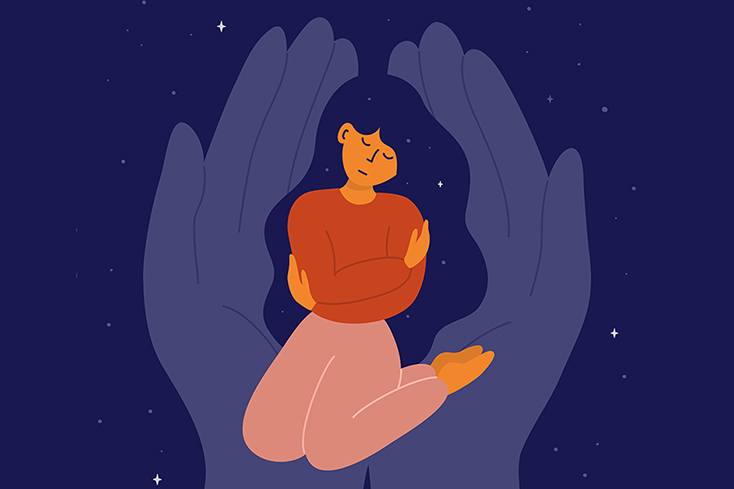By Katherine Rundell

When you’re going through #depression, it can be even more difficult to cope when your friends and family are unsupportive. It can even worsen symptoms when someone you’re close to makes cold or thoughtless comments or blames you for your symptoms. So, what do you do in this situation?
While the ideal is to surround yourself with people who are understanding of what you’re going through or willing to try and understand — this is not always possible. Here are some things you can do for yourself when those closest to you don’t understand.
Acknowledge the Situation
At a certain point, you must realize and acknowledge that not everyone will understand. There could be a certain reason they’re behaving that way that has nothing to do with you. It’s possible this is an ingrained and subconscious behavior if they grew up learning that: it’s unacceptable to show any signs of #mentalhealthissues or that symptoms of #mentalillness are signs of “weakness.” Or, they may be older and from a generation where #mentalillness comes with more #stigma than it does now.
Be Your Own Cheerleader
At the end of the day, you must be your own greatest support. Although it takes practice, treat yourself with kindness and gentleness. Talk to yourself in a positive tone. If you are negative with yourself, it will only worsen your symptoms. If your mind is going in circles and going over negative things, try to find different ways to change your thoughts and your mentality. Look for different ways to break the pattern, such as reframing your thoughts from “I hate myself” to “I have #depression and need to give myself compassion.”
Don’t Believe #Depression Misconceptions
Whatever anyone says, #depression is not a reflection of laziness or weakness. #Depression is a medical illness. No matter what you might think, the concept that you’re asking for help purely to “get attention” is a myth. #Depression is about hanging on until you can start getting better. Remind yourself of these facts, especially when someone is being unsupportive.
Understand that Other People Struggle, Too
It’s possible that a friend of family member cannot support you because they are dealing with their own #mentalhealth problem. They may be sympathetic to what you’re going through but aren’t able to support you. If someone is too entrenched in their own issues, it doesn’t mean they don’t care about you, it just means they can’t support you because their internal resources are simply all used up trying to care for themselves. Try to be patient or even offer your support to that person if you can. Sometimes the best way to feel better is to help someone else.
Look for Other Sources of Support
If you find that your friends and family aren’t giving you the support you need, consider looking for others who can. Consider joining a #depression support group, either by attending one in person of looking for one online. At first you might be wary of opening up to a group of strangers, but you may find that those going through a common struggle and experience can be great friends to have.
Ask for Help Explicitly
Don’t hesitate to be direct when asking people for help. It might be that your friends and family are willing and wanting to support you but they just don’t realize what you need. They may not even realize how much help you need because they see the strong exterior you show. Most people can’t read minds and will be more willing to help if you give them explicit directions.
Cut Out Negativity
If you have gone through these steps and people are still being negative in your life, knowing what you’re going through, you may need to end those relationships. Some people are just mean-spirited or hurtful, and you may have to cut them out of your life for your own mental well-being. If you can’t end the relationship, you should find methods to limit contact or cope against their comments. Although this is one of the hardest things to do, don’t be afraid to minimize contact with people who are hurtful toward you.
Turn Negativity into a Positive
Sometimes you can use your emotion, like anger, to your benefit. Instead of channeling these negative emotions, feeling them all internally and beating yourself up for the way the relationship is, use this anger and emotion for something positive. Go get exercise and fresh air, or smash up some ceramic tiles and use the pieces for a mosaic or even angry clean your house. By doing something physical, you can release your energy and emotions and it’s healthy to have an outlet for your negativity and anger.
It’s certainly difficult to go through #depression. It’s even harder when your close ones aren’t supportive. However, even if your friends and family don’t give you the support you need, you can still give the compassion and support you need to yourself.
#JamesDonaldson notes:
Welcome to the “next chapter” of my life… being a voice and an advocate for #mentalhealthawarenessandsuicideprevention, especially pertaining to our younger generation of students and student-athletes.
Getting men to speak up and reach out for help and assistance is one of my passions. Us men need to not suffer in silence or drown our sorrows in alcohol, hang out at bars and strip joints, or get involved with drug use.
Having gone through a recent bout of #depression and #suicidalthoughts myself, I realize now, that I can make a huge difference in the lives of so many by sharing my story, and by sharing various resources I come across as I work in this space. #http://bit.ly/JamesMentalHealthArticle
Katherine Rundell, an editor with OXEssays and Best Essay Writing Services, focuses on topics related to health, wellness, and #mentalillnesses. She is interested in different natural and spiritual ways for people to help themselves and improve their quality of life. Also, she is a contributor at Custom Paper Writing Service.




